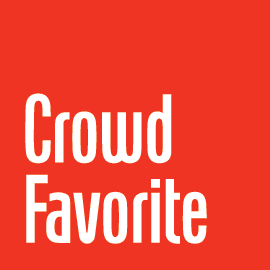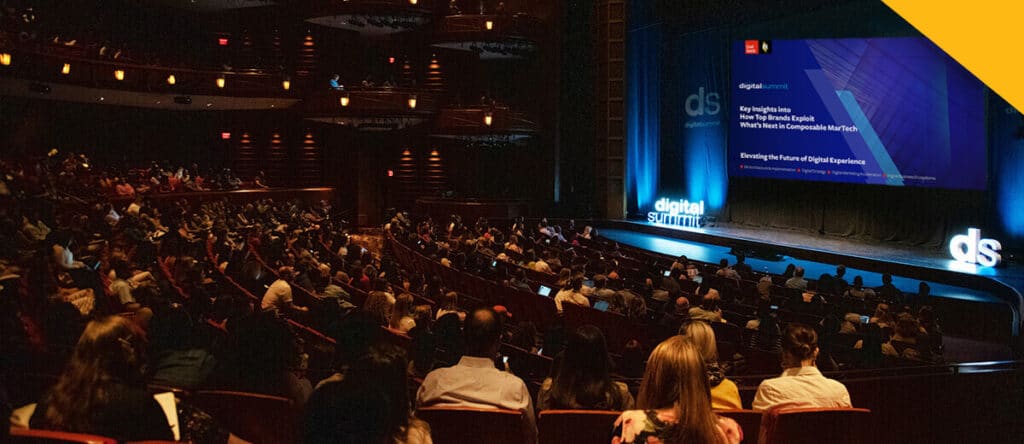Over the last few years, Crowd Favorite has worked with dozens of companies pulling together disparate technology stacks to provide an integrated MarTech stack. At the enterprise level every company is distinct and different, especially in terms of how it engages with its customers and clients. That network of relationships is as unique as a human’s fingerprint, and so is the network of technologies, processes and people that support it. We have found that the unique properties of Free Open Source Software (FOSS) technologies have given our clients a set of powerful advantages in their competitive efforts, and have saved them time and money.
We’re going to explore these benefits with you over a series of articles in the coming weeks. We’re technologists, and firm believers in Open Source ourselves, and eventually we’ll drill into that technology difference and advantage, but before that we’ll dive deep into the actual business advantages our clients have experienced, and which you could too. We are unashamedly “evangelists” of Open Source, and we honestly believe that it offers tremendous advantages to everyone who engages with it.
Why Composable MarTech is the Future for the Enterprise
In this ongoing article series, we’ll explore the benefits of Composable MarTech using Free Open Source Software. This approach empowers brands to seamlessly integrate and test new technologies, features, or vendors by effortlessly adding or replacing components within the platform.
- Part One: The Path to Agility
- Part Two: Flexibility, Speed, and Integration, Coming Soon
What is a Composable MarTech Solution?
At its core it is a digital solution to a business problem. It starts with an Agile CMS along with integrated services from different providers, built to function smoothly as a single platform. You are in effect, composing a solution from several individual pieces. This approach is centered around selecting “best of breed” technologies to build your commerce stack and bringing them all together so customers/visitors have a seamless experience.
The Rising Costs of Proprietary MarTech Stacks
The key drivers for any business decision to invest in a Marketing Technology stack (MarTech stack) are threefold: save money, increase revenue and help you grow. We know that the cost of recurring licenses for proprietary software is onerous, and inflexible, and something you can avoid. Year on year the suppliers add features and increase cost. But the key question is, do their added features add value for you?
How confidently can you say that the increased feature list of a SaaS product matches the strategic direction for your marketing efforts? If you’re already finding that a majority of the features are not salient to your goals and not fully utilized by your team, then what confidence can you have that the SaaS roadmap is going to deliver proportionally more value for your business? The gap in confidence is where you need to consider the alternatives.
The Real Costs: FOSS vs. Proprietary Systems
In general FOSS has no license fees associated – if using a CMS such as WordPress it’s likely you may want to use some of the more popular commercial plugins, and those are licensed with a subscription model. However the cost differences are telling – Yoast for example, at it’s highest tier of billing, with the core plugin plus four other software packages, costs just £229 ($292) per annum. This is significantly less than typical license costs for enterprise SaaS products.

The Freedom & Flexibility of
Composable Infrastructure
Composable solutions built with FOSS give you options in your infrastructure that SaaS simply doesn’t. When dealing with a composable approach you have the option of looking at this in detail and choosing the level of infrastructure technology and support that best fits your business needs. From dedicated, fully managed application hosting (such as what’s provided by the Pagely’s and Pantheons and WPEngines of this world) to far more bare-bones approaches of running your own AWS or GCloud. The full spectrum of value and costs is open to assess and choose from. You are also free to change and grow and reconfigure as you see fit, without causing any downtime in the public-facing or internal site.
Debunking the Turnkey Myth
There is an inaccurate perception that with a proprietary system, you’ve got a turn-key solution, and with just a small configuration process you’ll be able to use the system to the fullest extent. Anyone reading this from inside an enterprise will possibly have a wry grin at this point – that “configuration” can be complex to define, awkward to implement, and frankly never-ending.
Most enterprise MarTech users will need either an extensive internal team, or a dedicated agency, responsible for configuring and integrating their proprietary system, integrating it with other tools, and keeping those modifications and configurations up to date. The market for Composable solutions using FOSS development is dynamic, and active, and offers the buyer the confidence that they will get enterprise experience and skills they need rather than simply chasing scarcity.
There is an inaccurate perception that with a proprietary system you’ve got a turnkey solution, and with just a small configuration process you’ll be able to use the system to the fullest extent.
– Ant Miller, Director of Client Engagement
Hidden Lifetime Costs: Security Implications
Beyond these obvious costs, there are a number of less obvious, longer-term lifetime costs to consider. One key aspect is security. When we consider the risk of a cyber attack, and the costs associated with mitigation and insurance, the FOSS option emerges as a front-runner. FOSS projects use their communities to maintain a watch on potential vulnerabilities, offering bounties for reporting issues. By virtue of being developed in the open, they cannot rely upon obscurity as a barrier to “bad actors.” Hence vulnerabilities can be discovered and remain open for extended periods, leading to unmanaged risk.
Further, the fact that a Composable platform built upon FOSS can be designed more or less from the ground up means that there is far less risk of complex customizations “breaking” built-in assumptions upon which security depends – if you’re building, not bending security, you’re a lot less likely to break it!
Lower risk means lower insurance premiums and less onerous mitigation strategies. It’s just better.
The Legacy of FOSS Systems
Everyone loves a platform they can rely upon for a long time, and certainly, many FOSS platforms offer that – WordPress has been around for 20 years now, with some of the earliest enterprise clients moving to it over 15 years ago. WordPress has been built without “user retention” as a core commercial imperative, which makes it one of the easiest platforms to migrate data in or out of. The well understood database structure has literally thousands of scripts available to help expedite data migration. This approach also means that WordPress “plays well with others,” offering easy data exchange with other tools and able to act headlessly through interfaces such as its own REST API, and also the GraphQL approach. Making these things easy makes them lower cost.
Open Source MarTech
Success Stories
See how Crowd Favorite helped our clients Emmys, Nvidia, and Academic Partnerships successfully leverage Open Source to deliver a true Omnichannel experience.
The Choice is Clear
While the building out, support, growth and eventual refresh of an enterprise scale marketing technology stack is a complex undertaking, and budgeting for it can be enormously challenging, long experience has shown us that a well put together Composable approach using FOSS offers plenty of opportunity to reduce expenditure and focus investment where it counts. For the smart enterprise digital marketing team, we know the FOSS approach is the best way to get the value and impact you need without spending money you don’t have to.





